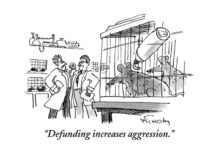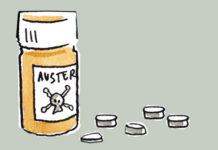Researcher Critiques Misleading Claims About Antidepressants
Recent claims about antidepressant effectiveness have been based on misleading statements and misunderstandings of the science.
Poverty, Pathology and Pills: An Interview with Dr. Felicity Thomas and Dr. Richard Byng
MIA’s Tim Beck interviews Dr. Felicity Thomas and Dr. Richard Byng about their report, Poverty, Pathology, and Pills, which situates increasing rates of mental health diagnosis and psychiatric prescriptions within socioeconomic and policy trends across the UK.
Getting Pharma Out of Medical Education: An Interview with Dr. Adriane Fugh-Berman
MIA's Gavin Crowell-Williamson interviews PharmedOut founder Dr. Adriane Fugh-Berman about Big Pharma's influence on medical education.
Psychiatrists Argue For More Attention to Iatrogenic Harms
Psychiatrists argue that current practice fails to account for the interaction of biological, psychosocial and iatrogenic factors.
Psychotropic Medications Serve as Powerful Tools for U.S. Military, Imperialism
Ethnographic research sheds light on extensive psychopharmaceutical use by soldiers in post 9/11 U.S. wars.
Children Taking ADHD Drugs More Likely to Take Antidepressants as Teens
Adhering to a commonly prescribed medication for ADHD in children is associated with higher chances of being prescribed antidepressants in adolescence.
Exposure to Antidepressants in the Womb Linked to Autism
Researchers, publishing in Toxicology Research, review the evidence that antidepressant exposure in the womb is linked to autism spectrum disorders (ASD) in humans.
Exposure to Antidepressants in the Womb Linked to Autistic Behavior in Mice
Researchers experimenting on mice found that exposure to fluoxetine (Prozac) in utero resulted in behaviors considered in animal studies to be analogous to autism in humans.
Service-Users See Long-Term Antipsychotic Use as Compromising Recovery, Review Finds
A new meta-review examines the experiences of antipsychotic drugs use among people diagnosed with a psychotic disorder.
Sodium Nitroprusside Shows No Efficacy in Schizophrenia Treatment
Researchers question biases of preliminary trials that found that sodium nitroprusside, an antihypertensive drug, has positive effects on schizophrenia symptoms.
Antidepressant Use Linked to Longer, More Frequent Psychiatric Rehospitalization
New study finds that antidepressants may negatively impact recovery after psychiatric hospitalization.
The New Yorker Peers into the Psychiatric Abyss… And Loses Its Nerve
The New Yorker's story on Laura Delano and psychiatric drug withdrawal is a glass-half-full story: It addresses a problem in psychiatry and yet hides the deeper story to be told. A story of how her recovery resulted from seeing herself within a counter-narrative that tells of the harm that psychiatry can do.
The Impact of Regression to the Mean in Psychiatric Drug Studies
Could the statistical phenomenon of regression to the mean be responsible for the dramatic effects of placebo—as well as the supposed effectiveness of some psychiatric drugs?
William Styron: His Struggles with Psychiatry and Its Pills
Author William Styron is often remembered for speaking about depression as an illness. But a review of his life reveals that psychiatric drugs may have triggered and even worsened his depressive episodes.
More Psychological Supports Needed to Manage Antidepressant Discontinuation
Study reviews psychological interventions for antidepressant discontinuation.
Withdrawal Symptoms Routinely Confound Findings of Psychiatric Drug Studies
Researchers examine how rapid discontinuation can mimic the relapse of mental health symptoms and confound psychiatric drug studies.
The Effects of Antidepressant Exposure Across Generations: An Interview with Dr. Vance Trudeau
Dr. Vance Trudeau discusses his study's finding that antidepressants may have far-reaching, adverse effects that last up to three generations.
Adderall Use Associated with Increased Risk of Psychosis
Twice as many teenagers with ADHD experienced severe psychosis when taking Adderall, as compared to Ritalin, according to a new study.
Combining Mirtazapine with Existing SSRI or SNRI Does Not Improve Depressive Symptoms
Study finds combining mirtazapine with an SSRI or SNRI is not clinically effective for improving depression in primary care patients who remained depressed after taking an SSRI or SNRI.
Does Active Placebo Response Explain Antidepressant Results?
A new study investigated whether participants guessing if they have an antidepressant or placebo affects response rates.
Peer-Support Groups Were Right, Guidelines Were Wrong: Dr. Mark Horowitz on Tapering Off Antidepressants
In an interview with MIA, Dr. Horowitz discusses his recent article on why tapering off antidepressants can take months or even years.
How Do Clients Solicit Medication Changes With Psychiatrists?
Researchers examine psychiatrist-client interactions and find that clients are often left with few opportunities to make explicit requests to change their medication regimen.
Very Slow Tapering Best For Antidepressant Withdrawal
A new article in Lancet Psychiatry finds that slower tapering of SSRIs is better for preventing antidepressant withdrawal effects.
Psychological Interventions Can Help When Tapering Off Antidepressants
Meta-analysis of antidepressant tapering finds CBT and MBCT can aid in tapering, but limited studies met inclusion criteria.
New Study Finds Limited Effectiveness for Antidepressants After Stroke
The researchers found that although antidepressants had a slight short-term effect on reducing the likelihood of depression diagnosis, there was no long-term improvement, nor any improvement in motor functioning.

































